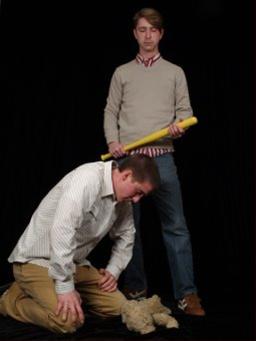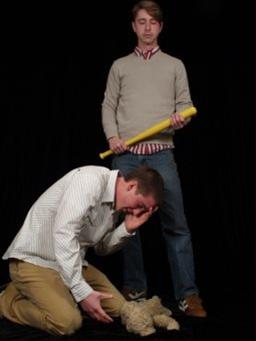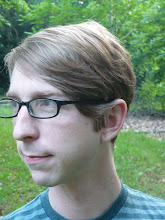
After spending six hours in the car exploring Marcus Slease's manhood (not quite as tawdry as it sounds, but close), we arrived at the Eyedrum Gallery in Atlanta, Georgia. It was a beautiful space; cavernous, filled with paintings and installations that actually did not suck. The stage was large and well-lit, and the sound system was terrific. We drank beer and mingled with the Atlanta poets as what sounded like Surrealist sound poetry played over the PA. We split into two cells for the reading - David Need, Ken Rumble, and Randall Williams in one, Marcus Slease and I in the other. David's poems were leavened with his usual vivid lyrcism. His first poem was particularly wonderful, and since he read it very fast, in my mind's eye I saw the poem bathed in the light from a blood-red sun flying up and down like a yo-yo. The unrelenting attention in Randall's poems makes you wonder whether you actually speak the language, and if you watch him closely when he reads, you'll notice that he's levitating an inch above the stage. Words leave him like tiny weights and his body arches upward. Ken enlisted Bruce from Coconut Poetry at the last moment to read one of his "Monologues for Voices", in which simple realities question themselves to exhaustion. He also read a new poem that I love, or, I should say, "l l l l l o o l l l o v lo ll e e e ll o v v l e". You probably had to be there, but watching Ken attempting to express language in a moment of utter collapse, I thought him very corageous. Marcus and I read from "This is the Motherfucking Remix", an in-progress collaborative chapbook that pits my F7 process against Marcus's Marcus process to produce rather disorienting effects. It was the first time we've publically read any of it, and we gained a lot of insight from audience responses and our own intuition. The audience was terrifically attentive, and we got good responses to our collaborative reading style - by jumbling up the poems of the whole group into one mass, we achieve unexpected resonances and tensions within the work, which would not manifest if we were all just reading from our respective manuscripts for fifteen minutes.
It was at this point that things began to get out of hand. We went to a bar called Manuel's with a group of the Atlanta poets, including Laura Carter, John Lowther, Heather Brinkman, Zac Denton, Tracey Gagne, Randy Prunty ... it was all perfectly civilized at first. Then Marcus decided that everyone needed to drink shots of Jaegermeister. They were served in little plastic medicine cups. We had very many of them. I remember singing the song that Marcus's grandmother sang to him when he was little, the one that sounds suspiciously like a drinking song: "I u-dul-used to pla-da-lay my little ol' ban-jo-da-lo..." I remember marvelling at the $250 bar tab. But I do not remember walking out the door. The next thing I remember is my face slamming into the concrete parking lot. How exactly this happened remains unclear. There are conflicting reports. I know that Marcus was right on top of me when I fell, perhaps holding my arms, which would explain a) the high velocity with which I hit the pavement and b) why I cushioned the blow with my face instead of my arms. I contend that Marcus tackled me, but he denies it, maintaining that I "tripped." We don't think the nose is broken, but we are not sure. Big thanks here to John, Tracey and Randy for letting us be unruly in their home until five in the morning. It takes a special kind of person to let out of town poets with blood all over their faces invade your space.
After about two hours of sleep, we rallied our decimated forces and prepared to head to Athens. I looked in the death mask in the mirror and felt conflicted. On the one hand, it looked pretty tough, and we entertained ourselves all weekend joking around about it. "Dude, what happened to your face?" "You know, poetry reading." Everyone we met was regaled with tales of the former beauty lurking behind my new hideousness. On the other hand, it hurt like shit, and while it was all fun to joke around with my friends about it, I thought about having to explain it to strangers: I mean, essentially, I got really drunk and fell on my face. It sounds kind of sad out of context. So I wore it with a mix of embarrassment ("I am getting too old for this") and pride ("I love life so much I'm willing to destroy my face in search of it, see?"). Our hosts took us to breakfast at a local diner and sent us on our way. In Athens, we found a coffee shop that had a "quiet room" (an ingenious innovation, to have a room where no one is allowed to play music or talk in a coffee shop) and began to put together our set. At the Flicker Bar, we were greeted by the lovely (Marcus would say "brazen") Sabrina Mark, who organized this reading for us. It was sparsely attended - four in the afternoon is maybe an odd time for a reading - but we had a great time. David had stayed behind in Atlanta, so it was just the four of us, and, possessed by the unholy animation of the profoundly tired, we nevertheless turned in a reading we felt good about. I would love to reconstruct it for you but I was so tired I barely remember it now. I remember cracking up as Marcus read an early
Resident Alien poem that juxtaposed expressions of religious devotion with lists of food. There was a Christmas tree in the back that had those glowing fiber-optic lights coruscating over it and it was hypnotizing me. We had dinner with Sabrina and her friends Kristen and Brian (whose last name I unfortunately don't know), then went to our cheap hotel for a power nap. When we emerged, somewhat rejuvenated, we went to a bar with Sabrina, Brian and Kristen. Ken Rumble, it has to be noted, didn't drink a drop all weekend, yet maintained his almost obscene energy level. Randall wore a fur-lined vest that I was sort of jealous of. We played darts and pool. We sang the song again, several times. We found out that Marcus has seen his doppelganger and is therefore going to die. He asked for group hugs until everyone became uncomfortable. He was very into us being "like a family" and sharing food all weekend. We inflicted no further injury upon one another. We stayed up too late again.
Spending a weekend in close proximity with poets who are also people you love remakes the world into something both awesome and terrible. The sky gets too portentous, and every stone gets overturned, and you feel a little crazy but you want to do it forever. Even so, having just been home for a few hours, I feel banality starting to close around me like a fist ... what I mean is that we'll come read anywhere, anytime, for free, if you just ask us. To escape banality, even for a weekend, is worth any absurd bar tab or facial reconstruction. Thanks again to all the wonderful people who helped us get away.







